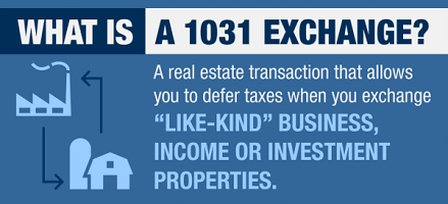A 1031 exchange, also known as a tax-deferred exchange, is a tax provision that allows investors to defer paying capital gains taxes on the sale of an investment property by reinvesting the proceeds into a similar property. This type of exchange is an important tool for real estate investors and can provide a number of benefits.
- Deferral of capital gains taxes: The primary benefit of a 1031 exchange is the deferral of capital gains taxes. When an investment property is sold, the profits from the sale are typically subject to capital gains taxes. However, by conducting a 1031 exchange, investors can defer paying these taxes until they sell the new property or until they no longer meet the requirements for a 1031 exchange.
- Increased buying power: By deferring capital gains taxes, a 1031 exchange provides investors with increased buying power. This increased buying power can help investors purchase a more valuable property or a property with a higher potential for growth.
- Preservation of wealth: A 1031 exchange helps investors preserve their wealth by allowing them to defer paying taxes on the sale of an investment property. This preservation of wealth can help investors build a larger portfolio and increase their long-term financial security.
- Ability to upgrade properties: A 1031 exchange provides investors with the opportunity to upgrade their properties by reinvesting in a new property that is more valuable or has a higher potential for growth.
- Diversification of investments: By conducting a 1031 exchange, investors can diversify their investments by reinvesting in a new property in a different location or in a different type of property. This diversification can help reduce investment risk and increase potential for returns.
- Improved cash flow: A 1031 exchange can help improve an investor’s cash flow by allowing them to defer paying capital gains taxes. This improved cash flow can be reinvested in the new property or used for other investments.
- Flexibility: A 1031 exchange provides investors with a high degree of flexibility. Investors can choose to reinvest in a similar property, or they can choose to purchase a completely different type of property, such as a commercial property or a rental property.
- Continuity of business: A 1031 exchange allows investors to continue their real estate business by deferring taxes and reinvesting in a new property. This continuity of business can help investors build a larger portfolio and increase their long-term financial security.
- Professional assistance: A 1031 exchange can be complex and time-sensitive, and it is recommended that investors work with a professional, such as a real estate attorney or a qualified intermediary, to ensure that the exchange is completed correctly.
- Requirements for a 1031 exchange: In order to qualify for a 1031 exchange, there are several requirements that must be met. These requirements include using the proceeds from the sale of the first property to purchase a new property, meeting strict timelines, and reinvesting in a similar property.
A 1031 exchange is an important tool for real estate investors. By deferring capital gains taxes and providing increased buying power and flexibility, a 1031 exchange can help investors build a larger portfolio, improve their cash flow, and increase their long-term financial security. However, it is important to understand the requirements and limitations of a 1031 exchange and to work with a professional to ensure that the exchange is completed correctly.





